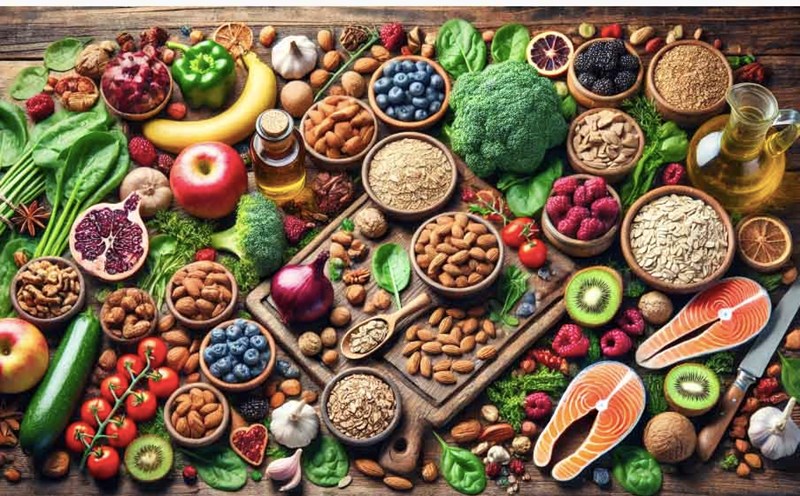According to Doctor Hoang Minh Khoa II - Xanh Pon General Hospital (Hanoi), blood lipid disorders can lead to a number of dangerous diseases such as atherosclerosis, coronary artery disease, pancreatitis, stroke (encephalt barriers), heart attack, etc.
The cause of blood lipid disorders can be primary (genetic) or secondary (due to nutrition, sedentary lifestyle or diseases such as hypothyroidism, polycystic kidney syndrome, etc.).
Here are some foods recommended for people with impaired blood lipid metabolism
Rawly processed cereals (black rice, raw rice...): These are foods rich in fiber, which help reduce cholesterol levels in the body, while cereals also help patients feel full for a long time and regulate their weight very well.
Non-fat milk: Patients should prioritize the use of non-fat dairy products and provide adequate nutrition such as vitamins A, B, C, E, zinc, magnesium... to help improve their health.
Lean meat or skinless poultry: Contains low cholesterol content, so patients should use white meats such as chicken, goose, duck instead of red meats.
Oily nuts: Some nuts such as black beans, tofu, soybeans, red beans... are nuts rich in omega-6 fatty acids and many other minerals that are very good for people with blood lipid disorders.
Fatty fish: Patients should prioritize eating fish, using them at least twice a week with fish such as herring, tuna, carp, salmon, mackerel, etc.
unsaturated vegetable oils: Some vegetable oils also contain omega 6 which are good for health such as sesame oil, sesame oil, soybean oil, sunflower oil, etc.
Garlic: is a food that increases HDL-C (High Density Lipoprotein Cholesterol), reduces LDL-C (Low Density lipoprotein Cholesterol), total cholesterol, blood triglycerides. In addition, garlic is also good for preventing atherosclerosis, preventing the formation of blood clots. However, patients should not use too much garlic because they can have eyelid inflammation, conjunctivitis and irritation of the stomach lining.
Onions: Have the effect of reducing blood cholesterol, improving atherosclerosis, reducing blood viscosity like aspirin.
Soybeans: One study found that eating 100g of soybeans per day can reduce blood cholesterol levels by 20%, especially LDL-C. Soybeans, black beans, soybeans and bean products are all good for people with dyslipidemia.
Cucumbers: A food rich in fiber, helps improve digestion and reduce blood cholesterol.
Seaweed: As a food rich in iodine and magnesium, seaweed can prevent the formation of cholesterol deposits in the capillary walls. In addition, laminaria polysaccharide in seaweed also helps reduce total cholesterol and triglycerides.
pepper: Contains a lot of vitamin C, which helps improve the body's microcirculation and reduce cholesterol in the blood.
Cauliflower: There are 2 types of white and green cauliflower that are high in fiber, vitamins, minerals and especially flavonoids. Flavonoids are a substance found in many foods, which cleanse the vessel, eliminate cholesterol that is still deposited in the vessel walls, help prevent thrombocytopenia, reduce the occurrence of diseases related to the heart.
Bitter melon: Is a food rich in vitamin B1, vitamin C and many other minerals. Bitter melon can reduce disorders in blood lipids, improve the body's resistance and can stimulate insulin secretion, helping to reduce glucose in the blood.
Green bean sprouts: contain a lot of vitamin C, which helps eliminate harmful substances in the body, especially fat, which can reduce blood cholesterol and reduce cholesterol deposition in the vessel walls.
Carrots: Rich in beta carotene, vitamins, fiber, minerals, thereby help reduce blood lipids and lower blood pressure.
Mushrooms: Some mushrooms such as shiitake mushrooms, linh chi, and tissues have the effect of reducing cholesterol and triglycerides in the blood.
Apple: Is a fruit that contains a lot of pectin, which should reduce disorders in blood lipids.
Kiwi: High in arginin, helps increase blood vessel circulation, limit the formation of blood clots, reduce the risk of blood lipid disorders, coronary artery disease, atherosclerosis, heart attack...
Bananas: Have the effect of purifying the taste buds, preventing constipation, cooling down, and laxatives. In addition, banana stems also have the effect of reducing cholesterol in the blood.
Celery: Contains a lot of fiber, vitamins, minerals, so it is very good for people with dyslipidemia.











